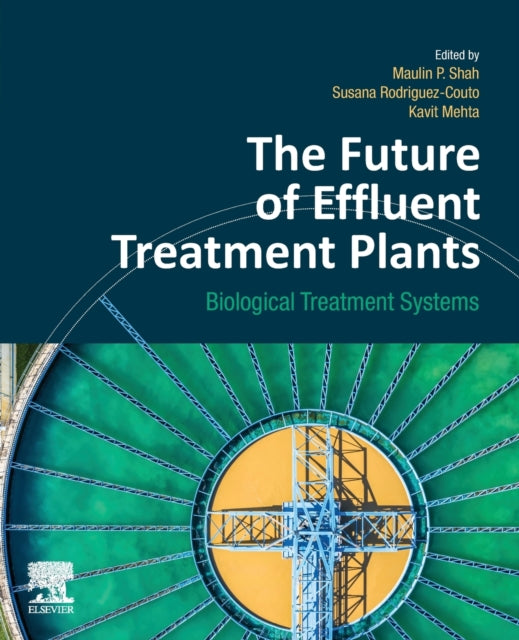Shulph Ink
The Future of Effluent Treatment Plants: Biological Treatment Systems
The Future of Effluent Treatment Plants: Biological Treatment Systems
YOU SAVE £16.65
- Condition: Brand new
- UK Delivery times: Usually arrives within 2 - 3 working days
- UK Shipping: Fee starts at £2.39. Subject to product weight & dimension
Bulk ordering. Want 15 or more copies? Get a personalised quote and bigger discounts. Learn more about bulk orders.
Couldn't load pickup availability
- More about The Future of Effluent Treatment Plants: Biological Treatment Systems
The Future of Effluent Treatment Plants: Biological Treatment Systems is an advanced and updated version of existing biological technologies that includes their limitations, challenges, and potential application to remove chemical oxygen demand (COD), refractory chemical oxygen demand, biochemical oxygen demand (BOD), color removal, and environmental pollutants through advancements in microbial bioremediation. It highlights the importance of respiration, nitrogen mineralization, nitrification, denitrification, and biological phosphorus removal processes in the development of a fruitful and applicable solution for the removal of toxic pollutants from wastewater treatment plants.
Format: Paperback / softback
Length: 804 pages
Publication date: 28 May 2021
Publisher: Elsevier Science Publishing Co Inc
The future of effluent treatment plants is poised to undergo a significant transformation with the advent of advanced and updated biological treatment systems. These systems, which are a refinement of existing biological technologies, offer a promising solution to address a wide range of environmental challenges.
One of the key challenges facing effluent treatment plants is the removal of chemical oxygen demand (COD), refractory chemical oxygen demand (RCOD), biochemical oxygen demand (BOD), color removal, and environmental pollutants. Traditional biological treatment methods have limitations in addressing these complex pollutants, necessitating the development of innovative approaches.
The book "The Future of Effluent Treatment Plants: Biological Treatment Systems" provides a comprehensive overview of these advanced biological technologies and their potential applications. It delves into the limitations, challenges, and opportunities associated with microbial bioremediation, a key component of these treatment systems. By exploring recent developments in microbial bioremediation, the book introduces new trends and advances in environmental bioremediation.
Furthermore, the book illustrates how the application of these emerging innovative technologies can lead to significant energy savings and resource recovery. It emphasizes the importance of respiration, nitrogen mineralization, nitrification, denitrification, and biological phosphorus removal processes in developing fruitful and applicable solutions for removing toxic pollutants from wastewater treatment plants.
Understanding the dynamics of water movement through wastewater ecosystems is crucial in designing effective treatment systems. The book provides valuable insights into the theoretical modeling of water movement and its implications for effluent treatment plant design.
In addition to microbial bioremediation, constructed wetlands and activated sludge processes are highlighted as important components of effluent treatment plants. Constructed wetlands, in particular, have shown promising results in treating wastewater and removing pollutants through natural processes. Activated sludge processes, on the other hand, are widely used for treating organic waste and producing biogas, a renewable energy source.
The future of effluent treatment plants lies in the integration of advanced biological treatment systems, theoretical modeling of water movement, and the application of innovative technologies. By addressing the challenges of COD, RCOD, BOD, color removal, and environmental pollutants, these treatment systems can help improve water quality, reduce environmental impact, and promote sustainable development.
In conclusion, the book "The Future of Effluent Treatment Plants: Biological Treatment Systems" offers a valuable resource for professionals and researchers in the field of wastewater treatment. It provides a comprehensive overview of advanced biological technologies, highlights their limitations, challenges, and potential applications, and emphasizes the importance of respiration, nitrogen mineralization, nitrification, denitrification, and biological phosphorus removal processes. By integrating these innovative technologies and understanding the dynamics of water movement through wastewater ecosystems, effluent treatment plants can become more efficient, effective, and sustainable in the years to come.
Weight: 1610g
Dimension: 235 x 191 (mm)
ISBN-13: 9780128229569
This item can be found in:
UK and International shipping information
UK and International shipping information
UK Delivery and returns information:
- Delivery within 2 - 3 days when ordering in the UK.
- Shipping fee for UK customers from £2.39. Fully tracked shipping service available.
- Returns policy: Return within 30 days of receipt for full refund.
International deliveries:
Shulph Ink now ships to Australia, Belgium, Canada, France, Germany, Ireland, Italy, India, Luxembourg Saudi Arabia, Singapore, Spain, Netherlands, New Zealand, United Arab Emirates, United States of America.
- Delivery times: within 5 - 10 days for international orders.
- Shipping fee: charges vary for overseas orders. Only tracked services are available for most international orders. Some countries have untracked shipping options.
- Customs charges: If ordering to addresses outside the United Kingdom, you may or may not incur additional customs and duties fees during local delivery.


